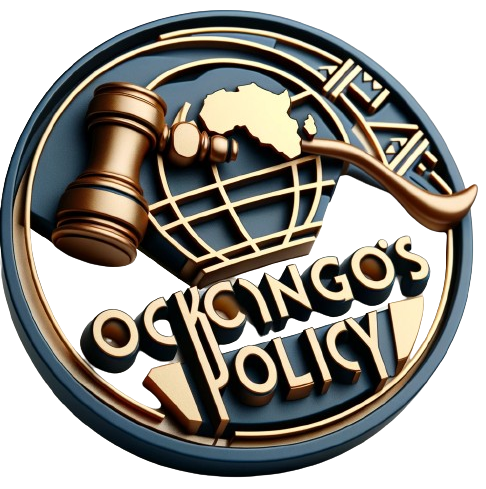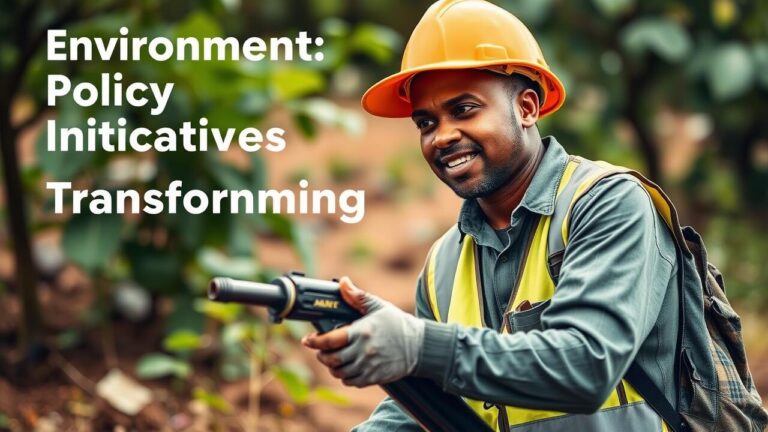The Evolution of Economic Policies in Africa: A Historical Perspective
Globalization has dramatically transformed Africa’s economic tapestry, weaving in a complex mix of opportunities and hurdles. The gateway to international markets has empowered African nations to broaden their export horizons and draw in foreign investments like moths to a flame. With the rise of global supply chains, local enterprises have found ways to slip into the intricate web of the world economy. Yet, this newfound access is not without its pitfalls; the unpredictable ebb and flow of global markets can leave these economies vulnerable — teetering on a precarious edge marked by overreliance on commodity exports and exposure to external shocks that can hit hard.
But wait, there’s more! The ripple effects of globalization don’t stop at trade and investment alone. It’s also been a catalyst for an exhilarating exchange of ideas, technologies, and cultures that invigorate innovation across the continent. While this torrent of knowledge holds great promise for boosting productivity and spurring growth, it simultaneously poses dilemmas for local industries struggling to keep pace with rapid change—employment dynamics hang in the balance too. Striking that delicate equilibrium between harnessing competitive advantages while ensuring sustainable development is now more critical than ever. Policymakers face an uphill battle: crafting strategies that safeguard local interests without stifling the vibrant potential born from globalization’s embrace.
Trade Agreements and Economic Integration Efforts
Trade agreements are the lifeblood of economic integration among African nations, weaving a complex tapestry of collaboration and opportunity. Their primary goal? To dismantle trade barriers, ignite intercontinental commerce, and bolster regional unity. Recently, the spotlight has turned to ambitious initiatives like the African Continental Free Trade Area (AfCFTA), which aspires to forge a unified marketplace for goods and services across this vast continent. By harmonizing tariffs and standardizing regulations—an intricate dance of diplomacy—these agreements have the potential to catalyze a surge in intra-African trade, allowing countries to tap into their distinctive resources and market advantages.
Yet, the journey toward economic integration transcends mere trade pacts; it’s a multifaceted endeavor. Enter regional powerhouses such as the Economic Community of West African States (ECOWAS) and the East African Community (EAC). These organizations do more than just facilitate trade—they champion investment opportunities, drive infrastructure development, and align policies among member states with an eye towards synergy. This collaborative spirit is crucial for nurturing sustainable development, fortifying economic resilience, and sharpening Africa’s competitive edge on the global stage. Through these concerted efforts—a symphony of cooperation—nations can weave stronger economic bonds that not only uplift individual countries but also tackle shared challenges head-on.
The Role of Technology in Economic Development
Technological advancements are not just important; they’re absolutely pivotal in reshaping the economic tapestry of African nations. Both governments and private sectors are awakening to a crucial truth: integrating digital tools isn’t merely beneficial—it’s essential for streamlining operations, amplifying productivity, and carving out competitive edges that can make or break businesses. Take agriculture and telecommunications as prime examples—innovations in these arenas have opened up vast market opportunities for smallholder farmers and budding entrepreneurs alike. Consider mobile banking platforms! They’ve turned financial services on their head, granting millions of unbanked individuals access to the economy—a transformative shift that ignites growth while championing financial inclusion.
But wait, there’s more! The surge of digital entrepreneurship is proving to be a powerhouse driving economic development across the continent. Startups with a keen focus on technology and innovation aren’t just creating jobs; they’re tackling local challenges head-on with bespoke solutions crafted for specific needs. This vibrant ecosystem flourishes thanks to an uptick in venture capital funding alongside incubation programs designed explicitly to cultivate emerging talent. As African countries pour resources into digital infrastructure and nurture a culture steeped in innovation, they strategically position themselves to harness technology as an engine propelling long-term economic prosperity forward.
Digital Innovation and Entrepreneurship Growth
The explosion of digital technologies has dramatically transformed the entrepreneurial scene across Africa. Picture this: mobile connectivity and internet access surging like a tidal wave, giving rise to a multitude of startups that spring forth with innovative solutions crafted specifically for local dilemmas. This dynamic shift isn’t just about diversifying economic activities; it’s also about opening up a treasure trove of job opportunities for the continent’s vibrant youth. Entrepreneurs are harnessing technology not merely to streamline operations but to revolutionize service delivery and tap into far-reaching markets that once felt utterly out of reach.
Meanwhile, government initiatives combined with private sector investments have been pivotal in cultivating an ecosystem ripe for digital innovation. Incubators and accelerators have proliferated, offering crucial resources and mentorship that budding entrepreneurs desperately need. And let’s not overlook the powerful alliances forming between tech hubs and academic institutions—these collaborations are nurturing talent and driving research forward, amplifying growth potential within this exhilarating sector. All these developments paint a vivid picture of how technology-driven entrepreneurship can significantly fuel economic diversification and resilience throughout Africa, promising an exciting future ahead.
| Startup Name | Industry | Location | Founded Year | Innovation Focus |
|---|---|---|---|---|
| Flutterwave | Fintech | Nigeria | 2016 | Payment Solutions |
| Jumia | E-commerce | Multiple Countries | 2012 | Online Marketplace |
| Paystack | Fintech | Nigeria | 2015 | Online Payment Processing |
| Twiga Foods | Agritech | Kenya | 2014 | Food Distribution |
| YAPILI | HealthTech | Kenya | 2015 | Health Information Exchange |
Current Trends in Economic Policy Formulation
In recent times, a fascinating transformation has unfolded across African nations—a pivot toward more inclusive and participatory methods in crafting economic policies. Policymakers are awakening to the vital role of stakeholder engagement, weaving together the insights of diverse socio-economic groups, from women to youth, into the very fabric of policy-making. This movement is emblematic of a deeper comprehension: sustainable economic development must cater to varied needs and champion equitable growth.
At the heart of this evolution lies innovative frameworks anchored in data-driven analysis that shape today’s economic strategies. Governments are harnessing technology like never before—revamping how they gather and use economic data—which paves the way for sharper forecasts and more informed decisions. This analytical lens enables them to track policy impacts over time with precision, allowing for nimble adjustments that resonate with emerging socio-economic hurdles. Consequently, we witness a metamorphosis in how economic policies are formulated—more dynamic, adaptive, and astutely attuned to the intricate realities of our contemporary economic terrain.
Sustainable Development Goals and Economic Planning
In the sprawling landscape of African nations, where aspirations intertwine with challenges, the integration of Sustainable Development Goals (SDGs) into economic planning emerges as a vital endeavor. Policymakers are awakening to a profound realization: the imperative of harmonizing economic strategies with the ambitious 2030 Agenda for Sustainable Development. This synergy is not merely an exercise in alignment; it serves as a catalyst for fostering economic stability while simultaneously tackling urgent social dilemmas—think poverty and inequality—and championing environmental stewardship.
Consequently, many countries find themselves on a journey of introspection, re-evaluating their development frameworks through fresh lenses that prioritize critical objectives like quality education, access to clean water, and decisive climate action. Yet here’s where it gets intricate: effectively weaving SDGs into the fabric of economic policies demands much more than surface-level adjustments; it calls for a multi-faceted tapestry woven from diverse threads.
Engagement becomes key—a symphony composed of various stakeholders including private enterprises, civil society groups, and international organizations. Their collaboration isn’t just beneficial; it’s essential for mobilizing resources efficiently and sparking innovative solutions. Moreover, infusing metrics rooted in SDG principles into policy evaluation processes acts as both compass and guidepost—steering governmental initiatives towards sustainable outcomes over time.
By embracing this comprehensive approach teeming with complexity and dynamism, African nations can sculpt economies that are not only resilient but also inclusive—economies that ambitiously chase growth while enhancing the quality of life for all citizens who inhabit them. The path forward is fraught with twists and turns yet laden with promise if navigated wisely.
Regional Economic Communities and Their Influence
Regional Economic Communities (RECs) have burst onto the stage as indispensable architects of African economic policy. These entities, like a vibrant tapestry woven from diverse threads, cultivate collaboration among member states while championing trade liberalization and regional integration. Initiatives spearheaded by RECs—such as the African Union and ECOWAS—not only bolster economic stability but also strive for uniform regulatory landscapes that can attract foreign investment and catalyze stronger economic performance. The collective prowess of these communities in tackling regional challenges is not just beneficial; it’s vital for driving development initiatives and aiding nations as they navigate the swirling complexities of globalization.
Yet, the impact of RECs transcends mere economic cooperation; they are instrumental in weaving national policies into a cohesive fabric aligned with broader regional and continental objectives. In fostering dialogue among member states, these organizations play an essential role in harmonizing economic strategies, thereby amplifying their collective bargaining power on the global front. This collaborative framework shines especially bright when addressing transnational issues—think trade barriers, infrastructural gaps, security dilemmas—that underpin both stability and growth within the expansive African landscape.
The Role of ECOWAS and African Union Initiatives
Regional cooperation stands as a bedrock of economic advancement in West Africa, where the initiatives spearheaded by ECOWAS intricately weave together trade dynamics, political stability, and social cohesion. Through an array of protocols and frameworks—like a complex tapestry—ECOWAS enables the fluid movement of goods and services among member states, thereby nurturing intra-regional trade to fortify economic resilience against external shocks. These endeavors are further enriched by efforts aimed at synchronizing policies on trade tariffs, transportation logistics, and infrastructure development—a collective ambition to amplify regional competitiveness on the global stage.
Meanwhile, the African Union emerges as an equally pivotal player, harmonizing national strategies with overarching continental goals that tackle pressing issues such as poverty alleviation and sustainable growth. Its ambitious Agenda 2063 paints a vivid picture of an integrated and flourishing Africa propelled by its own citizens’ ingenuity. By championing economic policies rooted in inclusivity and sustainability, the African Union galvanizes member states to unite in confronting challenges that extend beyond their borders. This dynamic interplay between ECOWAS and the African Union embodies a strategic blueprint for cultivating a cohesive economic landscape across the continent—a dance of collaboration toward shared prosperity.
Future Directions for Economic Policies in Africa
Policymakers across Africa are diving headfirst into the intricate dance of weaving technology into the very fabric of their economic strategies. The spotlight shines brightly on nurturing digital ecosystems, vibrant hubs where innovation and entrepreneurship can flourish like wildflowers in spring. This fervent movement mirrors the global pivot toward a knowledge-driven economy, a shift that is hard to ignore.
Governments are forging dynamic partnerships with tech companies, all in a bid to supercharge skills development and ramp up connectivity. These initiatives aren’t just lofty ideals; they’re tangible efforts aimed at bridging those glaring gaps in technological access that persist across various regions—a crucial step towards fostering inclusive growth that doesn’t leave anyone behind.
But wait—there’s more! Beyond this tech-savvy integration lies another critical pillar: sustainability. It looms large as policymakers grapple with crafting frameworks for future economies that tackle pressing immediate needs while also honoring environmental and social imperatives. By embracing the Sustainable Development Goals as their compass, these leaders aim for an equilibrium between robust economic growth and responsible environmental stewardship. This isn’t merely about keeping pace; it’s about ensuring development plans possess resilience and adaptability against the ever-evolving challenges on the horizon.
Emerging Trends and Priorities for Policymakers
In the dynamic landscape of African policymaking, a noteworthy transformation is unfolding—one where inclusive growth has surged to the forefront of economic planning. Gone are the days when mere GDP figures dictated success; now, there’s a palpable shift towards an expansive vision that seeks to uplift a broader swath of society. The urgency to tackle income inequality and bolster access to vital services like education and healthcare is not just commendable—it’s absolutely essential for nurturing sustainable economic ecosystems.
But wait, there’s more! As we navigate this intricate tapestry of development, another thread emerges: environmental sustainability. With climate change unleashing its wrath in ways previously unimaginable, policymakers find themselves at a crossroads—where integrating environmental considerations into economic strategies isn’t simply advisable; it’s imperative. They’re diving headfirst into green technologies and sustainable practices, determined to ensure that progress doesn’t come at the expense of our planet’s precious resources. This evolution in policy formulation signals a profound realization: that the health of our environment and the prosperity we seek are intricately linked—a symbiotic relationship that must be cherished if we are to secure long-term stability for future generations.
- Adoption of inclusive policies that prioritize equitable resource distribution.
- Investment in education and training programs to enhance workforce skills.
- Implementation of universal healthcare initiatives to ensure access for all citizens.
- Promotion of green technologies through incentives and subsidies for businesses.
- Formulation of strategies to address and mitigate the impacts of climate change.
- Collaboration with local communities to identify and address specific needs.
- Strengthening governance frameworks to enhance accountability and transparency in policy execution.
Conclusion
The evolution of economic policies in Africa paints a vivid tableau, a dynamic interplay molded by historical nuances, global currents, and an urgent quest for sustainable growth. As nations wrestle with the multifaceted challenges posed by globalization’s relentless tide, the infusion of technology emerges as an indispensable catalyst for economic metamorphosis. Recent patterns underscore the pressing need to harmonize policy frameworks with the Sustainable Development Goals—ensuring that economic initiatives ripple outwards to benefit not just coffers but also communities and ecosystems alike.
Peering into the horizon, policymakers find themselves at a crossroads—a critical juncture where emerging trends beckon them toward inclusive growth and digital innovation. The power of regional cooperation among diverse economic blocs will be paramount in sculpting Africa’s future financial landscape. Anchoring efforts on resilience and adaptability while weaving in strategic foresight becomes vital to tackle both present quandaries and forthcoming prospects brimming with potential.







